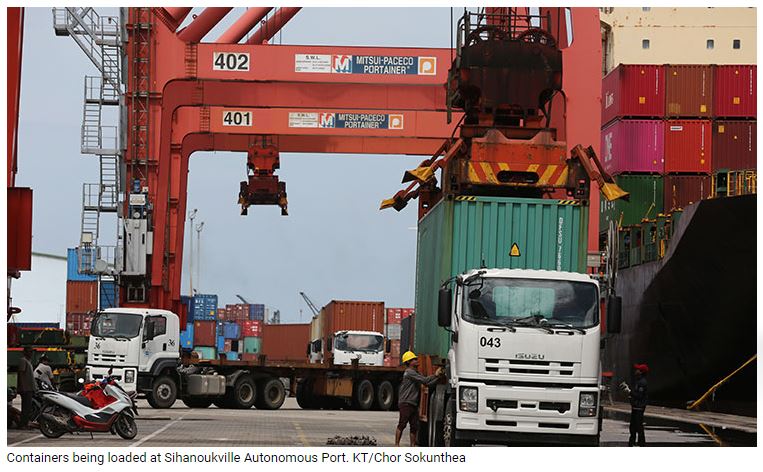Cambodia: ‘Regional trade deals outweigh Omicron’
ASEAN members have high hopes that entry into the Regional Comprehensive Economic Partnership on January 1 will boost trade within its 10 nations and the other signatories, China, South Korea, Japan, Australia and New Zealand. At the same time Cambodia is hoping to reap the rewards of a free trade agreement (FTA) with China that takes effect at the start of next year, along with an FTA with South Korea that will also come into force in 2022.
The rising number of Omicron infections in the region could thwart those hopes in the near term. In Vietnam the spread of the variant has prompted China to tighten border controls to protect its zero-Covid strategy. The Vietnam Fruit Association estimates the country’s exporters could lose as much as $175 million if some 6,200 trucks remain stuck at the border, according to local media. The country reported 15,182 new Covid-19 cases on Sunday.
Thailand has also put the brakes on its opening-up strategy due to rising Omicron infections. The government temporarily suspended the entry of both local and foreign nationals under the Test & Go scheme and restored mandatory quarantine until January 4.
Cambodia has been relatively untouched by the variant, with a total of just 31 Omicron cases as of Sunday. The country has also fully vaccinated more of its population than its neighbours, at 91 percent, compared with 75 percent in Vietnam and 73 percent in Thailand, according to the Reuters Coronavirus Tracker. As a result Prime Minister Hun Sen reaffirmed on Sunday that the Kingdom will continue the social and economic reopening that began on November 1.
“The Royal Government via its decisive fight against the pandemic has placed Cambodia in a pole position for a speedy recovery, and at the moment I don’t see this latest, and certainly not last variant to hold recovery back,” said Tassilo Brinzer, Chairman of the European Chamber of Commerce in Cambodia. “The Kingdom is well prepared. If the country continues on this path and aims to increase, in particular, quality tourism and more higher value investments we should be able to ride this ‘new normal’ successfully during the coming years,” he said.
American Chamber of Commerce President Anthony Galliano is equally optimistic about Cambodia’s progress under the ‘new normal’, given the success of its immunisation campaign.
“Countries are taking diverse paths, some living with the fact that variants will continue to emerge and taking only minor short-term actions, but keeping the economy open,” he said. “Other countries are taking more severe and restrictive measures. Cambodia being one of the most highly vaccinated countries in the world, and among the highest with the third jab, will likely only be negligibly impacted by Omicron and remain substantially on track for reopening.”
RCEP will create the biggest trading bloc in the world with nearly one third of the world’s gross domestic product (GDP) and population. RCEP and Cambodia’s new FTA’s will help European companies doing business in Cambodia, according to EuroCham’s Brinzer.
“Certainly these offer opportunities for some of our members who are producing here, for example in rubber and agricultural products,” he said.
“EuroCham constantly tries to promote Cambodia as a +1 market to European businesses already in the region. We have already months ago held seminars and workshops on the RCEP and its opportunities for exporters from Cambodia. Companies might want to broaden their supply chain in general, to access RCEP and other FTA signatory markets via Cambodia or expand on the benefits from the EBA (Everything But Arms) agreement with Europe, which still is 80 percent in place and continues to offer great export advantages to companies producing in Cambodia and exporting to Europe. These 80 percent should be viewed as 100 percent as we move forward.”
The EU reintroduced customs duties on some Cambodian exports in August last year, partially lifting EBA privileges due to human rights concerns but the EuroCham chairman. says it is still an incentive to global companies planning to manufacture in the Kingdom.
“The EBA is highly attractive for any businesses to export to Europe from Cambodia; for example many Chinese manufacturers that settle here hope to take advantage of this preferential market access to Europe. All of these trade agreements and market access routes, old and new, offer additional incentives to produce, manufacture or assemble in Cambodia and support economic growth and the post-Covid19 recovery…These trade agreements should make our work easier and help to attract investment to Cambodia. The upcoming investment law is another factor that will support this, and overall I am very optimistic that the coming years will yield solid growth for the Kingdom,” Brinzer said.
AmCham’s Galliano said while ASEAN may benefit from RCEP, the other signatories are likely to be bigger winners.
Japan and South Korea stand to be big winners from RCEP alongside China given the scale of trade between the three, Galliano added, saying Cambodia needs to make some structural changes to reap the rewards.
“The Kingdom will need to diversify its economy, depend less on garments and also concentration of its trading partners, with the United States dominating as the export destination at 40 percent, and China as the import partner at 40 percent. This imbalance in trade with these partners must be addressed for long-term sustainable trade,” he said.
Source: https://www.khmertimeskh.com/50996141/regional-trade-deals-outweigh-omicron/


 English
English




